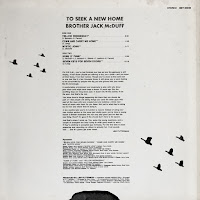Jack McDuff - Who Knows What Tomorrow's Gonna Bring
Released - 1971
Recording and Session Information
The Hit Factory, NYC, December 1, 1970
Randy Brecker, Olu Dara, trumpet; Dick Griffin, John Pierson, trombone; Paul Griffin, piano; Brother Jack McDuff, organ; Joe Beck, guitar; Tony Levin, electric bass; Donald McDonald, drums; Mike Mainieri, percussion; Ray Draper, percussion, vocals, tuba, arranger.
7105 Ya'll Remember Boogie
7106 Ya Ya Ya Ya Ya Ya
The Hit Factory, NYC, December 2, 1970
Randy Brecker, Olu Dara, trumpet; Dick Griffin, John Pierson, trombone; Paul Griffin, piano; Brother Jack McDuff, organ; Joe Beck, guitar; Tony Levin, electric bass; Donald McDonald, drums; Mike Mainieri, percussion; Ray Draper, percussion, vocals, tuba, arranger.
7107 Who's Pimpin' Who
7108 Who Knows What Tomorrow's Gonna Bring
The Hit Factory, NYC, December 3, 1970
Randy Brecker, Olu Dara, trumpet; Dick Griffin, John Pierson, trombone; Paul Griffin, piano; Brother Jack McDuff, organ; Joe Beck, guitar; Tony Levin, electric bass; Donald McDonald, drums; Mike Mainieri, percussion; Ray Draper, percussion, vocals, tuba, arranger.
7109 Wank's Thang
7110 Classic Funke
Track Listing
| Side One | ||
| Title | Author | Recording Date |
| Who Knows What Tomorrow's Gonna Bring? | Ray Draper | December 2 1970 |
| Ya Ya Ya Ya Ya Ya | Ray Draper | December 1 1970 |
| Who's Pimpin' Who? | Ray Draper | December 2 1970 |
| Side Two | ||
| Classic Funke | Jack McDuff | December 3 1970 |
| Ya'll Remember Boogie? | Ray Draper | December 1 1970 |
| Wank's Thang | Jack McDuff | December 3 1970 |
Liner Notes
Brother Jack is in the tradition of the new jazz organists who have managed to expand the almost-limitless boundaries of jazz music. Jazz is now respected - the free-flowing, improvisational structure is a reflection of the temperament of the times, the less formal attitudes that have made their way into all aspects of life. And it's proponents like Jack McDuff, with a wide scope of material and equally diversified arrangements, that have helped spark the well-deserved recognition jazz has come to receive.
Brother Jack uses a formidable group of musicians in this set recorded in three sessions during a bitter New York December. The album serves as a showcase for Jack's musical talents as well as those of orchestrator Ray Draper, who also provided four of the six compositions.
The music begins mysteriously in a jumble of effects that turns into the title song, moving and rhythmic, and goes from there into the guts of the album that doesn't quit throughout. The music is at times simple, and at others has the overtones of big band jazz - and all in all carries itself well - Brother Jack, Ray and the boys workin' together and makin' good sounds happen.












